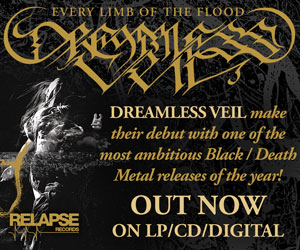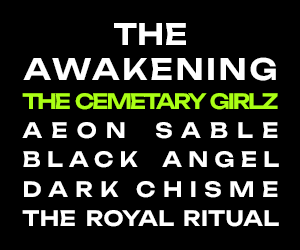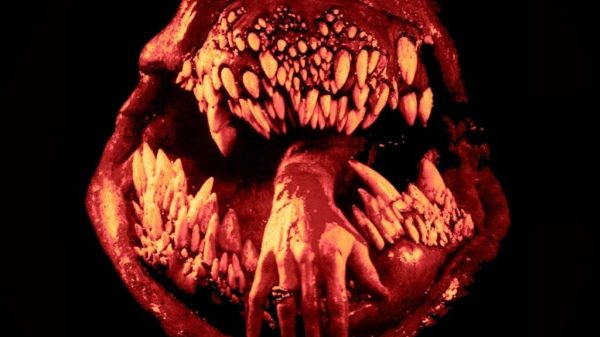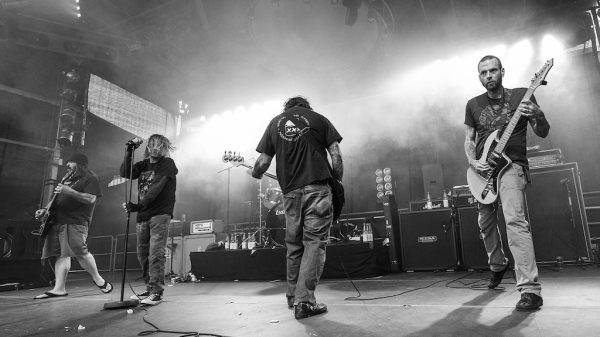Most bands of tenure struggle with the dilemma of creative stagnation and artistic exploration, striving to meet fans’ expectations while still developing their sonic palette. It is immensely difficult to satisfy the desires of all of one’s listeners, but for true artists, satisfying one’s own creative drives and expectations is nearly impossible. Recognizing these circumstances, Thou confronts them with passion and aggression, accepting the constant striving and self-discovery inherent in the artist’s journey toward the impossibility that is their own contentment.
Much like Campbell’s Monomyth, Thou’s career has featured periodic calls to adventure, to explore the unfamiliar, to engage with monsters and goddesses, to reap great rewards, and to return, renewed and changed, to their original home. Each Thou full-length, consequently, strikes that improbably balance of a return to form and of a startling maturation, meaning that each LP has been its own apotheosis, its own crowning achievement. Each Thou release has been Thou’s greatest material to date.
This is especially true of Umbilical, an LP that follows, like its predecessor Magus, a string of collaborations, experimentations, reimaginings, and cover collections. While it is not unusual for band’s to make forays like these–whether as side projects, remixes, lessons, self-induced creative handicaps–rarely do they present them as completely and honestly as Thou does. Pulling the curtain back on the creative process, allowing listener’s into the drawing room, Thou do what they have always done, critique the mystique of celebrity and horizontalize the fan-musician relationship.
First reviewed by Cvlt Nation here, Umbilical truly is the greatest LP, thus far, in a career of “best in genre” LPs. Marking nearly twenty years of spectacular multi-prefix doom releases, Umbilical shows a band at the height of their creative powers. It is hard to think of another release that so well simultaneously encapsulates and elaborates on all that makes a band spectacular. Heavier than anything they’ve done, it is also more rhythmically dynamic and more texturally provocative.
While, at this point, it is easier to compare other bands to Thou than it is to compare Thou to anyone else, Umbilical hints at the sonic heft of Godflesh, the percussive complexity of ΚΕΦΑΛΗΞΘ-era Ministry, the self-assured relaxation of Soundgarden’s “Slaves and Bulldozers,” and the majestic scope of Warning‘s Watching From A Distance. Meanwhile, the band explores more melodic territory than many modern “metal” bands allow themselves to explore, particularly on “The Promise” and “Panic Stricken, I Flee,” both of which feature transcendent background vocals from Silver Godling‘s Emily McWilliams.
Deconstruction and disruption are apt descriptors for the rhythm of Thou’s career to date, as they have been, by most accounts, the prime movers of a sea change in heavy music away from its history of, at best, political neutrality and, at worst, self-congratulatory hypermasculine cultural chauvinism. They have imported into the world of doom and sludge a more radical punk politics, espousing a DIY ethos long before it was fashionable and more sincerely than is profitable. One can thank Thou’s influence for the brilliant coterie of leftist doom acts touring the world today, as the genre’s ship had a different trajectory before they had charted this new path. And each release, and Umbilical especially, is a reminder of the revolutionary potential of a band that holds a mirror up to society and that, crucially, holds that same mirror up to themselves.
Umbilical is, like every contribution Thou has made to the metal milieu, a cause for celebration, a statement that causes the listener to think more critically about what other bands in the genre are doing and what Thou has done before. In a world that expects us to consume our music piecemeal through streaming playlists, Umbilical, abyssally dark in tone but sparklingly luminous with life, reminds us of what it means when music demands our time and attention, when it moves us, when it offers hope for the power of art to shine light on the ever-encroaching dimness.
Thou vocalist Bryan Funck spoke to Cvlt Nation about Umbilical.
I wanted to start with the new single because that one word honestly kind of caught me off guard. “I Feel Nothing When You Cry,” the first single off of Umbilical, seems like a different energy, especially following the last few releases. I was attributing this to Tyler, but I’d like to hear a little bit about the creative process behind that single and the choice to make it the first single off the new record.
Yeah, well, in terms of the decision to make it the single, when we finished writing and recording this record, the goal was to have a single LP—a very concise, palatable chunk. People are following us with Heathen and Magus, but those were very long, sprawling, dense records. So, with this one, we wanted to write more songs that were shorter and more frenetic, fun to play.
When we build a set for a show, sometimes it’s just a mix, whatever we feel like playing that night. Other times, we want to do a “pain set,” where it’s all very slow with lots of feedback. But then, we might have another set if we feel the crowd might be a bit more fun or we’re in the mood for more fun. We call that the “bonehead set” or “knucklehead set,” where we pack it with all the mid-tempo, more energetic songs.
I mean, we never really get fast, but we do have more energetic songs. We have a very limited number of those songs, and an even more limited number that all of us know how to play. The idea for the record, in terms of general music, was to write more of those energetic songs so we could have more to pull from. It was another exercise for us, something we hadn’t really tried before.
The songs come up, you write something, and it goes in a certain direction. Most of the energetic songs we’ve been pulling into our set were from splits or EPs, not from the main records. It was a fun experiment to see if we could do it as a full record. Whether we succeeded or not, I don’t know.
As for why we decided to make that the single, we basically had a little too much material for a single LP. So, we were going to cut two of the songs and release them as a 7-inch. The 7-inch was going to be its own limited thing.
It’s weird being in a band at a certain level or dealing with a certain size label that has a cookie-cutter way of rolling things out. I think that in the last 10 years, it has become an industry standard—even for indie labels and DIY bands—to follow a certain promotional model. You know, they want to have an announcement for the single, a bunch of singles, a preview, and then an announcement for the record, followed by an announcement that there’s an announcement about something coming out. To me, that’s goofy and silly; everyone does the same thing.
I run a record shop, so I see a lot of that stuff. I used to book shows for about 20 years, so I saw it all the time. It becomes white noise; I’m not interested in any of it. That being said, labels like Sacred Bones, Gilead, and Thrill Jockey all do this, and it’s fine. We don’t need to cause too many waves or be total rebels.
For me, it’s more fun to take the standard promotional model and tweak it a bit to make it interesting. We can flex some creative muscles and bring some intention to it, rather than doing the same thing everyone else does. Every record we’ve done with Sacred Bones has had some kind of cockamamie scheme for the rollout, and these schemes have succeeded or failed to various degrees.
Some of it is complications from pressing plants or other logistical issues that get in the way. Some of it is friction from dealing with too many labels and too many hands in the pot, which can mess things up. Sometimes, labels don’t always have the wherewithal to see a project through, and they might try to make it more vanilla, which may have happened in this case.
For this record, we had an LP but had to cut three songs. One wasn’t quite ready for prime time, and two of them were going to go on a 7-inch. “I Feel Nothing When You Cry” and “Unbidden Guest” were the singles, but they got cut because we couldn’t fit them on a single record. These songs were the ones that, when removed, made the sequence of the record flow better. They also fit together well as a pair.
When working on a sequence, I think about it as two sides of an LP with breaks. However, digitally, you can just place them back in the middle, and it still has a flow. I’m also very concerned about the bookends—the opening and closing tracks. The opening track is like the thesis statement, and the closing track is the conclusion, so it’s important they feel right.
It’s got to still retain that dynamic. You can’t just stuff in two extra tracks. I mean, you could—no one’s really going to care—but I would care. If I go back and listen to it in 10 years, I don’t want to feel like it was a mistake to tack these songs on randomly. They need to be in the right place. I don’t want to be constrained by the current format or by people’s expectations.
So, those were the two songs that got cut and were just going to be on the 7-inch. In my mind, it was more fun to have the teaser tracks for the record be those two songs. I don’t think of them as singles but as a taste of the record. They’re going to get played and pushed a lot, so I wanted those two songs to be the teaser for the record.
When people get the record, I want them to have a whole new experience, rather than skipping the songs they’ve already heard a million times. I want it to be exciting when the record comes out—a whole new thing they haven’t heard yet.
There’s a lot going on, but that’s the logic in my brain. I want the person getting the record to feel like it’s a new and exciting experience, not something they’ve already heard.
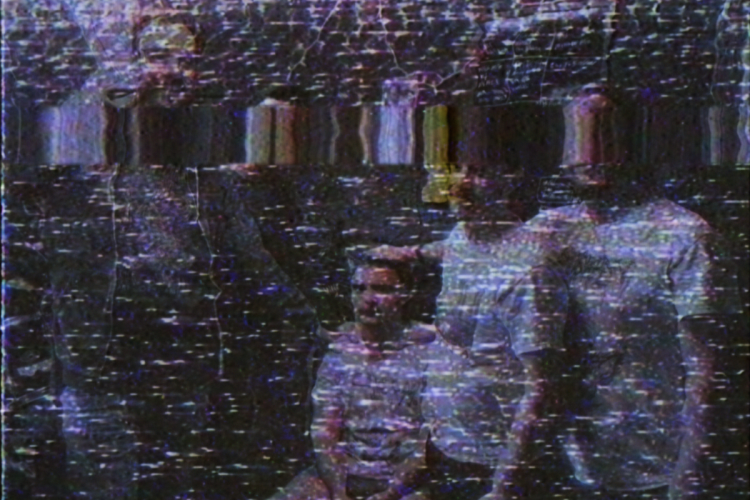
When I first heard that single, I was struck by how different it felt, especially compared to the last five or six Bandcamp releases. It was much more drum-forward, pushing the tempo more. I thought, “Wow, they’re taking this in a new direction.” But once I listened to the whole album, it made sense within the context of the record. It felt much more cohesive, fitting well into the narrative arc of the full album.
Yeah, going back to your question, Tyler does have a different style. For better or worse, we all have a say in the songwriting process now, and Tyler can conform to what we’re doing. That’s why we got him in the band. We know him, trust him, and he’s a good dude. He can handle the slow stuff just fine and bring his own flair to it. So, when we talked about doing this kind of record, we thought, “Now we have this guy who can play like this, we can push things in a certain direction.”
It was the same with the collaboration with Mizmor. Josh wasn’t really a blast beat kind of guy. Tyler, on the other hand, can handle blast beats if we want that. Pushing things in a more black metal direction with him playing drums was pretty easy, allowing us to explore more traditional elements if we wanted to.
I’ve noticed a rhythm in Thou’s releases. There’s usually a major LP release of original material, and in between, you have collaborative albums, EPs, or cover releases—whether they’re part of a 7-inch or a full collection of covers, as well as the recent ones with ERR, Hirs, Mizmor, Ragana, and Norco (Gewgawly I). This pattern of extra releases leading up to Magus felt stylistically experimental, especially with Rhea Sylvia and Inconsolable stuff. Can you talk about how that rhythm influences the songwriting process or plays into it? It seems like you kind of get into the sandbox in between larger releases. More than most artists, you’re allowing people a glimpse into the creative process beyond the narrow genre window.
In the past, yeah, with a full-length, we would start with an idea in mind. Someone would write the first song, setting the tone for the record, and then we’d write a bunch of stuff in that same vein. Of course, during the writing process, you end up with some stuff that doesn’t quite fit but that you still like. Some of it gets shaved off or tweaked to fit better. So, you end up with some extra material during that writing process.
In between records, it’s not necessarily a palate cleanser, but it’s a chance to do something different.
We would just write to write, and we let it be a bit freer. Other stuff came out, and by the time we got to Magus, that was just the standard for how we were doing things. We had talked about doing a drone record at some point—originally, Magus was going to be a drone record, then a black metal record, and at another point, acoustic stuff was on the table because we wanted to wrangle in this person or that person.
Then there was Rhea Sylvia because that was Matthew‘s solo stuff. There’s a demo version of that where it’s just him and an acoustic guitar. At some point, either during the writing process or when we were working on Magus, we thought, “What if we take these Sylvia songs and make them Thou songs?” So, that became Rhea Sylvia, which already had its own style.
Those three EPs leading up to Magus were very intentional.
After that, we did the Emma record, which was its own thing. Part of doing that was figuring stuff out for Roadburn and wanting to do something with her. We just really wanted to do a tour with her, and doing the record was just an excuse to get her to come on tour with us. So, that’s how that happened.It was a bit more spontaneous in the way it developed.
After that, we weren’t really sure what we were going to do. We had a rough idea for Umbilical, but we hadn’t started working on it yet. Then COVID happened, and we basically took a year off from even seeing each other. When we started talking about getting back together, the first thing we decided to do was to go for it.
So, the first thing we jumped into working on was writing a little chunk of songs. Sometime early on, the opportunities with Norco and the collaboration with Mizmor came up, both on slightly stricter deadlines. As we were writing, the focus shifted between all three projects based on deadlines and stuff. Liam contributed a lot to the Mizmor split, so we had him come out here a couple of times to work on it.
Our writing process has become more constricted these days. Tyler lives in Chicago now, but he was in Nashville before. We tried writing and practicing without him, but it didn’t work. So, we have to get him down here for little chunks of time to marathon writing sessions.
That definitely spread out the time it took us to write stuff. All of it probably could have been written in a much shorter period if Tyler lived down here and we were practicing every week. I’m not sure what the right recipe is in terms of pressure needed to get stuff done, but it seems like our process has stretched out a bit.
Regarding your question about our approach, yeah, that was the standard for how we did things for a long time: write a full-length, experiment with EPs and splits, collaborations in between, and then work on the next full-length. Going forward, we haven’t made a plan beyond this. We’re not sure. We know we’ll still be a band in a year, but beyond that, I don’t know anymore. The way we’re talking about it now is just to write and see what happens. If there are songs that make sense together as a record, we’ll put those together and do a record.
We got into the habit post-COVID of demoing stuff in the studio. James Whitten records almost everything for us, and his studio is right down the hall from our practice space. We’d have a writing session, and then at the end of it, we’d go down the hall for a few hours and do a rough demo of everything. Part of the idea was to experiment with the sound and all that, although we didn’t do much of that with the demos.
We talked about it endlessly, and in typical Thou fashion, we didn’t do it. Our time for the band is very limited, so even though we spend a lot of time doing stuff, there’s never enough time to get everything done. Sometimes we’re strapped for time, or people are just burnt out, and the more esoteric stuff often gets pushed aside.
Moving forward, we might keep demoing stuff as we write, or I might just record songs as we nail them down and build a bank of recorded material. That way, if we need to tweak or change stuff later, it might be quicker next time to get some material out.
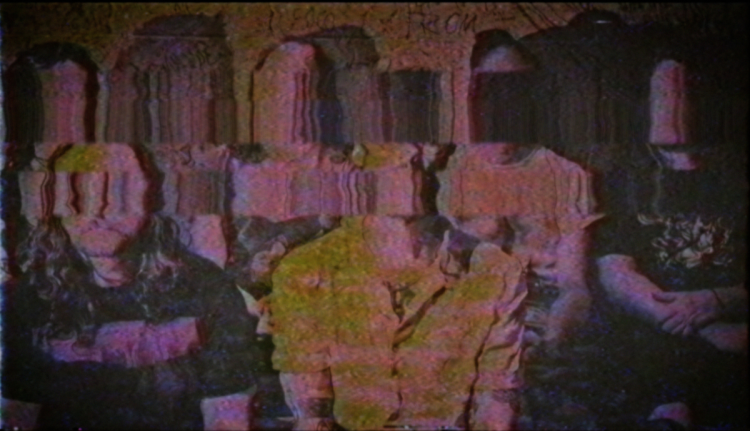
Just based on this record, I’d say it’s well worth the wait, especially considering the embarrassment of riches that were your last few releases.
I personally go back and forth on that stuff. On one hand, I want to get a lot out. Maybe it’s because I’m sort of chasing a serotonin thing—putting something out and getting a response. I love the feedback, even if it’s negative. I just want a response—that’s part of putting stuff out in the world.
On the other hand, as I’m getting older and looking at how much stuff we have, I always complain about bands like Guided by Voices or Built to Spill or Ween, where someone says, “Oh, you need to listen to this album,” and it’s like, “I don’t know where to start—they have a million records.”
It’s like getting into an anime after it’s been out for 20 years.
It’s too much. So, I almost don’t want to become one of those bands that has such an overwhelming catalog. But I guess we’re already past that point now.
There’s no wrong place to start, I would say. Speaking of feedback, something that’s always struck me, and please correct me if I’m wrong, is that I’ve always felt that Thou, in playing whatever you want to call it—blackened sludge, doom, or whatever label people want to put on it—has a real punk ethos. There’s a DIY ethic, experimentation, and a self-effacing humor. Thou is a band that takes its art seriously but doesn’t take itself seriously. I think that manifests most explicitly in some of your merch. Some of my favorite Thou merch makes fun of the fact that Thou even exists, which has been refreshing in a genre that’s historically been pretty self-serious. I wonder if you could talk a bit about whether this punk ethos is part of the Thou machinery and what role ego plays in it.
I guess, yeah. I mean, let me just say that I have no problem with bands being uber-serious. I like that—there are plenty of bands I like that are very serious. I’m not really attracted to bands that are too jokey or whatever; I don’t care for that. But I do feel like if you’re going to be serious and have merch and all that, it has to say something.
For me, the self-effacing stuff is an exercise in humility. I am trying to poke holes in the idea that bands or artists are these people on pedestals who have all the answers or are perfect people that must pass some kind of purity test to be worth paying attention to. Nobody’s perfect, and that’s fine. Bands are goofy, whatever. I love the idea of leaning into absurdity and surrealism—that’s fun and interesting.
To me, that’s part of the creative outlet. If you’re going to do something like a T-shirt, which is essentially just a tchotchke to sell and expand your brand, it shouldn’t be just a shirt with a logo. It has to say something in some way. I might obfuscate whatever that message is behind being a goofball or highfalutin language, but there’s intent behind it. There’s always intention behind what we do, even if it’s something seemingly stupid. We’re trying to make it meaningful.
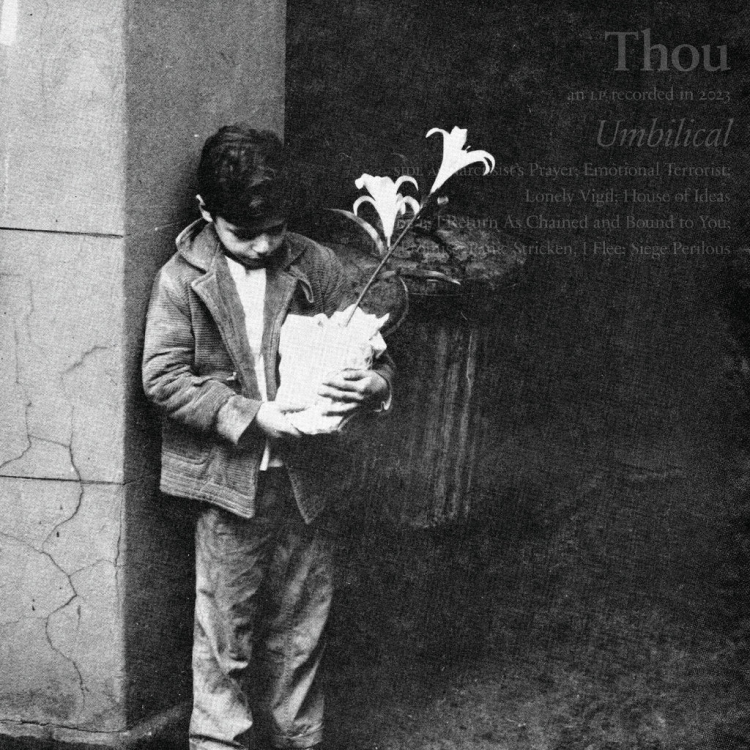
I think that messaging comes through.
Hopefully. It sounds like it does for some people. But I also think a lot of people might not get it—it might go over their heads. And honestly, I don’t care.
What I told Sacred Bones about the rollout and the track listing is that people are always going to be confused, no matter how plainly we present things. So, we might as well do what we want to do. If people get it, great. If not, that’s fine too. There’s always something there for them to figure out. And if they talk to one of us, we might explain it.
So, are we a punk band? I guess we are. That’s kind of what this record is about, trying to figure that out. When me and Andy started talking about writing this record, maybe in 2016 or 2017, the idea was to draw a line in the sand. We wanted to be very clear about our social and political viewpoints and not dress them up or hide them.
We just had too many knuckleheads coming out to see us who were not our people. In the metal scene—though it’s in every genre, really—you still see a lot of that. It might be less so now, but five or six years ago, the metal scene still had its share of boneheads. These were people who just didn’t get it, who were there for the wrong reasons. The idea was to distance ourselves from that crowd a bit.
Initially, the plan was to write a record that laid out our mission statement—who we are and what we believe in. But the more I’m working on that, the more I’m poking holes in it and seeing how we’re being hypocritical about this thing or that thing. I had to twist it. Rather than writing a record about the ideals we supposedly hold, and I had to write about where we’re falling short on those things.
Those are the broad strokes of the record, to write about the ideology I would have as a militant, 22-year-old DIY punk kid and how that kid would criticize this band. That’s the starting point, at least.
That really provides extra context for the album. It’s like a mature novelist’s approach to being retrospective about their career.
I don’t want to be self-effacing for its own sake. It can be fun, sure, but it’s also about personality. Growing up, my friends and I would always take the piss out of each other, always razzing each other. I’ve tried to get away from that a bit as I’ve gotten older, but I’ve always held onto the idea that if you’re going to criticize this thing or that thing, you better be willing to turn that on yourself. You have to be a lot harsher on yourself if you’re going to talk shit about everyone else. You need to be ready to look in the mirror, see your own faults, and work on those things.
Correct me if I’m wrong, but I feel like that attitude is captured well in a couple of your shirts. There’s one that says “Save Metal, Kill All Maiden Fans,” and another that says “Save Metal, Kill All Thou Fans.” That’s like the ethos in a nutshell.
When we were in Europe, we came across one too many Iron Maiden fans. Me and probably everybody else in the band—maybe Tyler likes them, I don’t know—we all hate Iron Maiden. Well, “hate” is a strong word. Whatever, people like what they like. But you come across one too many people who are super into a certain thing and also typify a certain type of consumer of art that’s just not your person. I hate making too broad of statements because I like things with a lot of costumes and gimmicks. For example, you’re wearing a Perfume Genius hat. I like shit like that, so I don’t hate it all. But, as you mentioned, I also come from a DIY punk background, so I’m much more interested in having an actual human interaction. I want to go to a show where I can reach out and touch the band, talk to them after the show if I want to. That’s what I want—I don’t want the spectacle or whatever.
I’m not sure where I’m going with this, but I think the story with the shirt is a good example. Matthew was tagging bathrooms all over Europe with “Kill All Iron Maiden Fans, Save Metal,” so when we saw it, we thought, “Oh, we’ve got to put that on a shirt.” We knew people would be mad, but we also thought it was funny.
It’s the same reason we made the other shirt. I had tweeted something about it right after Roadburn or something. I had seen a bunch of people wearing Burzum shirts, and I tweeted something like, “I should start carrying around a can of spray paint so when I see someone wearing a Burzum shirt, I can just cross it out.” Oh man, people were after me about that. I got threats like, “I’m going to stab you when I see you at the show.” It was hilarious. So when we were doing another shirt, I thought it’d be funny to do exactly what I tweeted about Burzum shirts—cross it out with spray paint.

Speaking of this, it ties into both an antithesis or allergy to certain styles of metal and the bonehead ideology that follows metal around. It seems to me that there’s a cadre of bands moving against that traditional current. Many of them were involved in the Heavier Than Thou tribute and would probably trace their influence back to Thou in terms of integrating leftist politics into what has long been an arena of machismo and, at least, neoliberal conservatism, if not actual far-right conservatism. Can you talk about the modern landscape of doom metal projects like Sunrot, Body Void, Vile Creature, Cowardice, Chained to the Bottom of the Ocean, and others? It seems like a movement that works in opposition to the history of metal ideology.
I mean, I don’t know how much those bands were influenced by us necessarily. All the bands we’re friends with, the ones I consider our peer group, are mostly punks who just happen to play heavy music. The shit I listened to, especially hardcore, was from the mid-90s metalcore era with bands like Earth Crisis. That music was essentially metal but played by punks.
Even the crusty stuff like Noothgrush is basically metal, but the people playing it are punks. The politics in punk are predominantly radical left or anarchist. It’s more about those people playing that kind of music.
These days, it’s easier to find these bands because of the Internet. When I was coming up, you wouldn’t know about a lot of these bands unless you went on tour. They were obscure local bands. Now, with an Internet presence, it’s a lot easier for people to have a more global view of the landscape of whatever subgenre of music they’re into. I mean, honestly, I think that shift is just more informed by the type of people playing this kind of music.
That squares back with what I was talking about in terms of being a punk band playing metal.
When we were first coming up, all the bands we were friends with—Leech, Fell Voices, Ash Borer, Cloud Rat, False, Moloch—were all punks. They were all punk dudes who came from punk and hardcore backgrounds and just happened to start bands in that heavier style. Before I joined Thou, they were like a post-rock band. Then some of the members discovered Sunn O))) and started listening to more Eyehategod and Crowbar, and the band’s style morphed into this other thing. By the time I jumped onboard, it had already veered into that heavier realm. I just decided I was going to scream; I can’t do anything else. That pushed the band more into being a heavy band.
You mentioned Eyehategod and Crowbar. I personally hear a lot of Crowbar influence in this album, maybe more than in the last few. Can you talk a little bit about NOLA DIY and the Baton Rouge scene? What does being a Louisiana, New Orleans, or Baton Rouge band mean to your style?
For me, Crowbar wasn’t a big influence until Matthew wanted to cover them on the Rhea Sylvia project. Eyehategod I’ve been seing since I was a teenager—they’ve been around since the beginning of time. They used to play hardcore matinees at the punk venue when I was a teenager, but that style of metal wasn’t really my thing. In New Orleans, especially in the late ’90s and early 2000s when I was coming up, there were distinct scenes—metal, punk, hardcore, and others—with their own hierarchies. The metal scene was separate, unless it was something like crossover bands such as The Dillinger Escape Plan, Botch, or Isis, which bridged the gap. These bands exposed me more to the New Orleans metal scene. If I found a New Orleans metal band that could fit with hardcore bands or if I got along with them, I’d try to get them to play punk shows.
One long-running powerviolence band from here called Rat in a Bucket, which went on to become Haarp, which is now Gristnam. I got into them when they were Rat in a Bucket. Those dudes were more metalish. The music itself, and they came from death metal bands before Rat in a Bucket, like Rat Anatomy and maybe one other band, but Rat in a Bucket is where I jumped on. They were more metalish dudes, and that’s how I got into the New Orleans scene.Or going to see a random show where a band like Eyehategod would be playing because they needed a black metal band, or something like Soilent Green, who were attached to Hydra Head and other bands.
So, can I speak to the sludge mecca of New Orleans? I think Matthew and Andy, who were the chief songwriters, loved all that stuff, so it definitely had a big influence. Especially the shift between the first demo and the Tyrant stuff. When they first started, they discovered early Pelican and were really into Isis’ Oceanic, that post-rock era. Their band before that, Translation, was like a rock band with some post-rock elements. They were going in a post-rock/post-metal direction. Before I joined, they played a few shows with Caspian and another band like that. There was some shift where they started listening to Southern Lord stuff, got deeper into Eyehategod and other bands, and started incorporating more drone and feedback.
Andy said the other night in practice, talking about what to do next, that when I joined the band, we started writing other stuff to work towards what we thought it was going to sound like with my voice on it.
So, I don’t know. Maybe once we made that shift from Matthew’s sort of Dax Riggs, Acid Bath crooning to just the screaming, they thought overall to lean into the sludgy metal stuff a little bit more. The first stuff they wrote right before I joined the band was probably “Smoke Pigs” and “Hooves”—both off Peasant—which I think was leaning more in that direction.

You recently mastered or rewrote and recorded those, and they feel very much in line with current Thou.
I mean, last year’s versions when we re-recorded them were just because we have a new lineup.It sounds like that because it’s the current lineup, and also we’ve been playing those songs for like 100 years now.
Those are all catalog songs that I still go back to in a playlist, and they feel very much contiguous with the current stuff.
Well, I mean, that’s part of our journey anyway. As experimental or as much as we think we’re pushing the sound in different directions, it’s baby steps for us. We have very grandiose ideas when we come out of recording, but they get chipped away and funneled into what Thou has to be. It has to fit. So, we push things, but when I look at it, it seems like just little steps along the way. There’s nothing we’ve done that’s a huge departure from the past. We know what we sound like. We know what it sounds like when we write together. We kind of have a rough idea of what we want a Thou song to be. We’ll push it this way and that way, but it still has to sound like Thou to us.
All these guys are in other bands that sound radically different from this, so we could write something that sounds like whatever, but it’s got to fit the framework we’ve created in some way. We’re slowly pushing further out, but it still has to fit cohesively. This is both good and bad. It can be creatively challenging because it puts certain constraints on us.
Andy, who has been the chief songwriter for the last couple of years, faces burnout. Even if he comes up with something great, it’s hard to bring it to practice if it feels like something he’s already written. Do we need to write another song that sounds like Heathen? We’ve already written that record. What’s the point? We need to work on the next thing and push it a little further.
A big part of this band is keeping ourselves engaged. We have to be excited about the new stuff we’re coming up with. If we’re not, what’s the point? We’re not raking in the dough or have any ulterior motives other than putting out music that we like and enjoy. It has to be fun for us.

I was interested in the past, both in your lyrics and your habit of using unattributed, esoteric quotes on merch. These touch on a lot of literary spheres, like Steven Erikson, William Blake, and certain leftist political thinkers. I’m curious about the lyrical material on Umbilical. You’ve talked a bit about the thesis or ideological approach, but are there specific lyrical influences you’re drawing on for this one?
The thing about that stuff for me, the “torment” or hip-hop remixing, is that I’m taking something I hear and reapplying it in a certain way because I see how it applies to another context. It’s not about the original intention of the lyric or quote, but how it fits within a new framework I’m creating. For instance, a Smiths lyric might not originally resonate with a particular idea I have, but when I recontextualize it, it makes sense for me.
So, it’s less about those sources directly inspiring me because of their original artistic intent and more about collecting stuff that I find interesting. I’m constantly collecting bits and pieces that sound cool, evoke a certain feeling, or make me think of something specific. It’s really random stuff. For instance, there’s a Pat Benatar lyric I referenced on this record, and the title of the single comes from a Dido song. I’m pulling things I like for whatever reason, regardless of their original context.
I have lists and lists of all kinds of stuff. Sometimes it’s just a word or a phrase that catches my attention, and I jot it down. Later, when I’m figuring things out, I go through my list and see what strikes me. If something fits, I move it here or there, change it, and build around it. Often, I might start with something, write a whole piece around it, and then discard the original part because it no longer fits with what I created. It’s less about specific influences and more about how I can grab something and reapply it in an interesting way.
That’s brilliant. I know we’ve covered a lot of ground, and I’m grateful for your time. I’d just like to finish by reminding readers of your upcoming tour plans with Full of Hell in Australia.
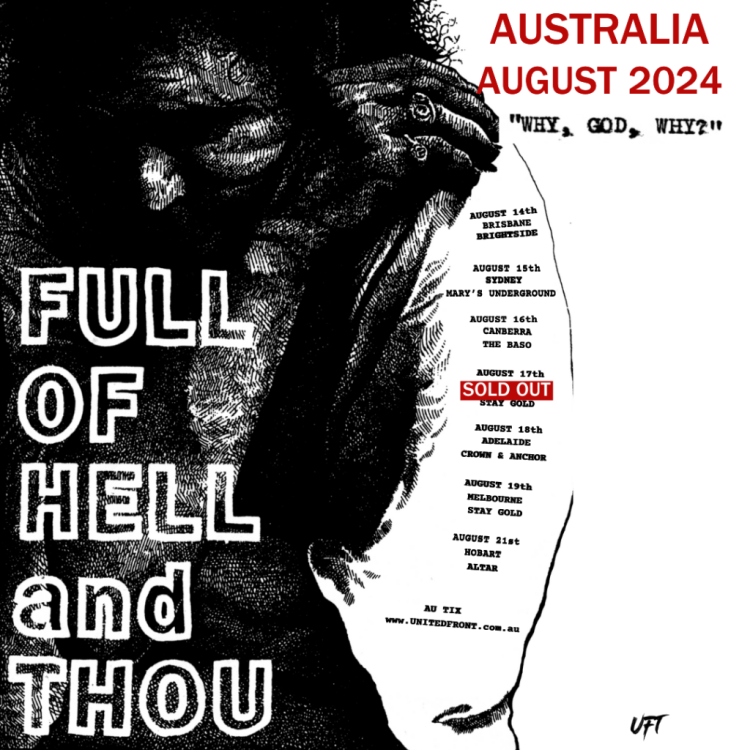
Umbilical was recorded and mixed at Hightower Recording by James Whitten.
It was mastered by James Plotkin.
Pick it up at Bandcamp or Sacred Bones.

